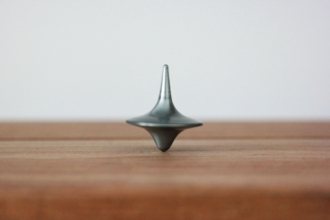Ugh, I blew it,” she repeats to herself.
Andrea’s still thinking about last week’s presentation.
Sitting at her desk on a Tuesday morning, she’s got a mental video loop on repeat. It shows the moment when she lost her place; when she briefly struggled to answer a question; the nervousness she felt throughout.
Despite showing preparation and poise in the majority of the presentation, she’s dwelling on the negative. Rather than focusing on today’s growing to-do list, Andrea’s cognitively stuck. She’s ruminating.
Rumination is relentless thinking focused on one’s negative feelings and problems. Whereas reflection can be productive, and motivate us to improve, ruminating is typically self-defeating. It can even be unhealthy.
But what if we learned to stop ruminating before we go too deep?
If Andrea had the tools to acknowledge the strengths and weaknesses of her presentation, and then move on, she’d likely be more productive, less anxious, and better at her job overall.
With the right tools, we can nip rumination in the bud, and avoid the consequences of negative thought loops.
Ruminating — a harmful defense mechanism
People don’t ruminate to deliberately inflict pain on themselves. Usually, we’re trying to do the opposite — avoid painful emotions.
Instead of confronting what’s really going on, we distract ourselves with more digestible thoughts.
Ruminators often believe that situations in their lives are uncontrollable. Rather than acknowledging that most people feel nervous while public speaking, and focusing on how to quell that nervousness, a ruminator thinks “Why is this happening to me?”
Researchers from the University of Manchester have found that ruminators believe that their overthinking will help them solve a problem. Clinical psychology David Carbonell agrees.
Because we feel vulnerable about the future, we keep trying to solve problems in our head.
Unfortunately, this is generally a fruitless effort.
Rumination worsens negative moods and interferes with our problem-solving capacity. Yale University researchers have also found that people who ruminate are more likely to become and stay depressed.

Unsurprisingly, the stress associated with chronic negative thinking can take a serious toll on our health — from suppressed immune functioning to increased incidence of coronary problems.
What’s more, overthinking stops us from taking action, even when our health is at stake. All that negative thinking burns precious cognitive energy, ultimately leading to mental fatigue, which can have a host of harmful symptoms: including mental block, lack of motivation, irritability, stress eating or loss of appetite and insomnia.
How to stop ruminating
If you have a tendency to ruminate, then consider the following your sane guide to finding some relief:
- Acknowledge. The first step toward breaking harmful thought cycles is to acknowledge that you’re ruminating. As the saying goes, we can’t see the forest for the trees. We get so deep in negative thinking, we don’t even realize that we’re punishing ourselves. And, says clinical psychologist David Carbonell, “The more we are engaged in overthinking, the less are we actually doing things in the physical environment.” But if we take a step back and identify what’s happening in our heads, we can move forward mindfully. Practices such as meditation can be helpful to train your mind to acknowledge such ruminative moments.
- Problem-solve. Next, switch into problem-solving mode. Decide whether there is anything you can do to resolve or ameliorate what you’re ruminating about. If so, make a list of concrete goals and steps to achieve them. If not, make an appointment with yourself to ruminate on that subject at a later time. Writes Robert Leahy, Director of the American Institute for Cognitive Therapy, “Chances are it won’t bother you very much when you meet up with it — and you will be able to enjoy your life during the rest of the day.”
- Get moving. When our thought cycles are especially overpowering, the best move is to get active. Go out and exercise: a workout session or a bike ride; a yoga class or a jog. If you’re at the office, a brisk walk can do the trick. Exercise not only releases stress-reducing endorphins, it also creates the perfect opportunity to practice mindfulness. The more we’re engaged in our current activity, the less mental space we have to ruminate.
- Get perspective. Finally, remember to put things in perspective. Be an objective observer, and describe the situation you’re thinking about without judgment. Then, consider whether your emotional punishment matches the crime. Often, we’ll find we’re being overly harsh on ourselves. If your stress doesn’t subside, visualize how you’ll feel in a week or a month from now. Be patient, and trust that you’ll feel that way soon. Whatever happened, it’s likely not the end of the world.
Break out of your comfort zone — stop dwelling
Dwelling on negative thoughts is not only unproductive, it can also threaten our health and wellbeing. It keeps us from being proactive about whatever’s bugging us and clouds our thinking.
Sometimes we’re more comfortable staying trapped in the hamster wheel of self-critical thinking.
We’re so accustomed to dwelling that it becomes an automatic reaction to stressful situations. But it’s worth the effort to retrain our brains to escape the rumination cycle.
By letting go of negative thoughts, we can move mindfully into the future and free up our brains for valuable cognitive work.













Send Comment: